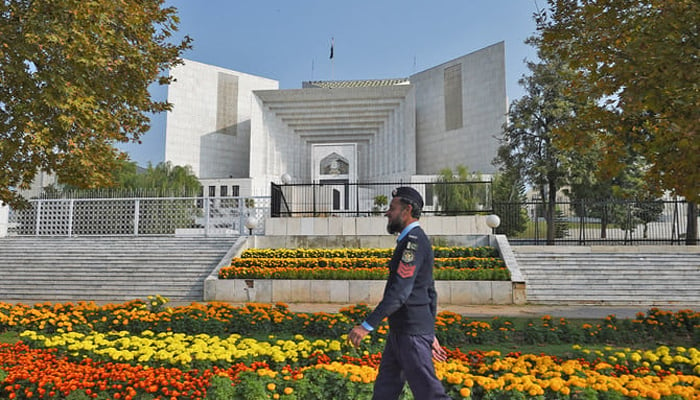Punjab polls: Top court to hear ECP plea against April 4 verdict on Monday
Review petition will be heard by three-member bench headed by Chief Justice Bandial
ISLAMABAD: The Supreme Court has fixed the Election Commission of Pakistan’s (ECP) review petition regarding its April 4 verdict on the Punjab polls for hearing on Monday.
A three-member bench, headed by Chief Justice of Pakistan (CJP) Umar Ata Bandial and comprising Justice Ijaz ul Ahsan and Justice Munib Akhtar, will hear the plea a day after the date it ordered the electoral body to hold polls on.
The apex court’s earlier verdict on a petition filed by the Pakistan Tehreek-e-Insaf (PTI), which was heard by the same three-member bench, came after months of drama around the polls.
The PTI-led Punjab government dissolved the provincial assembly in January in a bid to force the ruling coalition to hold snap polls. However, the government has consistently maintained that elections will be held in October or November this year.
The electoral authority had postponed the Punjab polls to October, which the PTI had challenged. The Supreme Court, in an April 4 order, declared the ECP’s decision to be unconstitutional, without lawful authority or jurisdiction, void ab-initio and of no legal effect.
It ordered the electoral body to hold polls in Punjab on May 14 and directed the federal government to release Rs21 billion for elections in Punjab and Khyber Pakhtunkhwa. However, the government has not released the funds yet.
Subsequently, the ECP moved the Supreme Court to review its April 4 directives earlier this month.
In a 14-page petition, the top election organising authority said that the apex court should review its decision as the judiciary “doesn’t have the authority to give the date of elections”.
“Such powers exist elsewhere under the Constitution but certainly not lie in a Court of law,” the ECP said, citing various legalities and reasons behind its statement.
The electoral body accused the Supreme Court of disregarding its constitutional jurisdiction, emphasising that it assumed upon itself the role of a public body in giving a date; “thus intervention by the court is necessitated to correct an error which has effectively changed the settled constitutional jurisprudence of the country.”
-
Security forces gun down 30 terrorists in multiple IBOs in KP: ISPR
-
MQM-P calls for new province in Sindh
-
US report validates Pakistan military edge over India: PM
-
Banned TTP poses serious threat to Pakistan security: UNSC panel
-
CM Afridi clarifies remarks on by-poll after ECP requests army deployment
-
Dubai sees 3.2m Pakistani passengers in 2025 as airport sets new milestone
-
Security forces kill 23 Indian proxy terrorists in KP's Kurram
-
Pakistan to construct island to boost oil exploration: report












